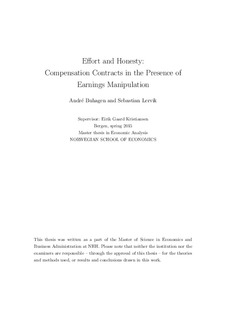Effort and Honesty: Compensation Contracts in the Presence of Earnings Manipulation
Master thesis
Permanent lenke
http://hdl.handle.net/11250/300126Utgivelsesdato
2015Metadata
Vis full innførselSamlinger
- Master Thesis [4372]
Sammendrag
Compensating managers with incentive pay may motivate earnings manipulation.
In this thesis, we develop models that suggest more efficient compensation con-
tracts that incentivize managers to exert effort and report honestly. We analyze
the manager's incentive to manipulate the financial statement when the manager
is remunerated with short-term and long-term incentive pay and when we apply
different performance measures in the manager's compensation plan.
We find that short-term incentives motivates both effort and manipulation,
while long-term incentives induces effort, but not manipulation. Shifting incentives
towards relatively more long-term pay will reduce earnings manipulation while
maintaining incentives for effort. This is because it is not possible to in
ate long-
term compensation through opportunistically overstating accruals.
We also consider the manager's incentive to manipulate when the manager
faces incentive plans with different performance measures. We predict that there
will be less manipulation when the stock price is used as a performance measure
relative to when accounting earnings is used. The reason is that when the reported
earnings goes through the "filter" of the market participants, the value of a high
earnings report is discounted if the market believes that the report may be ma-
nipulated. This reduces the manager's benefit of manipulation. The consequence
is less manipulation when the stock price serves as the performance measure.
